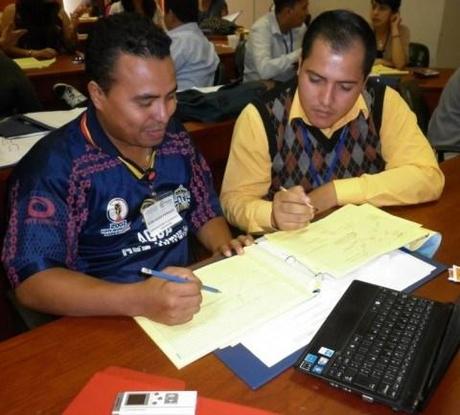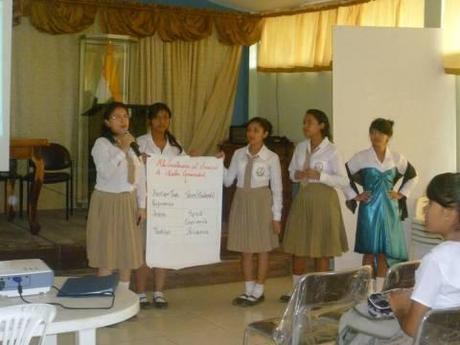
Over the course of June and July, nearly 1,000 high school and university students in cities throughout Ecuador learned about business plan development, leadership and communication, market economy, and democracy. However, they did not learn about these topics by reading their textbooks or from listening to a professional consultant or workshop facilitator. Uniquely, the message on the importance of a market economy, democracy, and an entrepreneurial climate came from a group of 45 aspiring young leaders and entrepreneurs. These 45 university students from rural areas of the country are the first participants in the Emprendedores Ecuatorianos (Ecuadorian Entrepreneurs) program organized by the Ecuadorian Institute of Political Economy (IEEP).
The Emprendedores Ecuatorianos program, launched earlier this year with local private sector and CIPE support, is modeled after the successful EmprendeAhora program in Peru. In this its first year, IEEP selected 45 participants based on a lengthy application process. The educational program took place from March to May at the Universidad del Espiritu Santo in Guayaquil and consisted of 100 hours of courses on leadership, business plans, democracy and economy, marketing, and human development.
These courses were led by prominent entrepreneurs, business plan coaches, and academics. The goal of each of the workshops (14 in total) mentioned above was for the program participants to put to the test knowledge they gained during the classes. By leading these “replica” workshops with their peers at universities and high schools in their communities, they reinforced the concepts in their own mind and shared them with a new audience.

Emprendedores Ecuatorianos participants conduct a replica workshop.
Now that the replica workshop phase of the program is completed, the students can focus even more on refining their business plan ideas which were first spelled out during the application phase and have been nurtured in person and virtually by professional business plan coaches since. A sample of business ideas include: a magazine focused on gastronomy; a public relations agency; a soy milk processing plant; and creating iPad applications.
Not surprisingly, many of these businesses have already moved from concept to reality, with some fine-tuning left to do. In September, IEEP will organize a business fair in Guayaquil to feature the participants’ plans. The fair will mark the end of the formal Emprendedores Ecuatorianos program for this year’s cohort, and they will receive their certificates of completion at that time.
Taking lessons from their counterparts in Peru, IEEP is actively working to create long-lasting linkages between program participants via social networks and alumni groups. As has been the case in Peru, entrepreneurship and leadership education programs can have a profound personal and professional impact on each of the participants. There is no doubt that in the coming years the ripple effects of this project will be felt around Ecuador, whether in the form of new businesses that create employment for others, more effective community leaders, or a greater understanding among the general population of the role businesses play in democratic and economic development.
Brent Ruth is Program Officer for Latin America & the Caribbean at CIPE.

